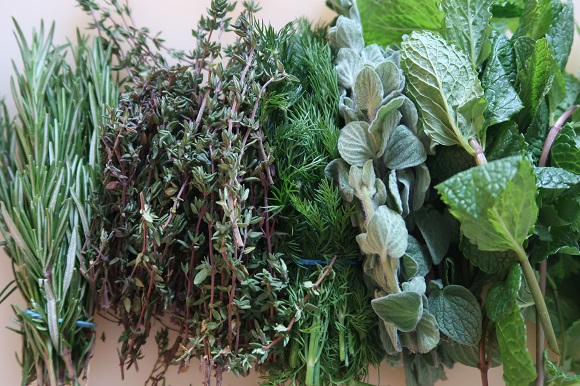
Herbs are a fantastic addition to your parrot’s diet, offering an array of health benefits while adding variety to their meals.
Incorporating herbs into your parrot’s diet can be done in multiple ways, such as chopping them up, threading them through cage bars, or even creating shredding toys. This encourages even the pickiest eaters to try fresh foods as they engage with and taste the herbs during play.
Why Herbs Are Beneficial for Parrots
Herbs provide essential vitamins, minerals, and antioxidants that are crucial for maintaining your parrot’s health. They can support digestive health, boost the immune system, and offer antibacterial and anti-inflammatory properties. Additionally, herbs can serve as natural enrichment, promoting mental stimulation and preventing boredom.
Easy Access to Fresh Herbs
You can find fresh herbs in the produce aisle of your local supermarket, often at an affordable price, especially if you shop later in the day when prices might be reduced. Alternatively, growing your own herbs at home is a cost-effective and convenient option. You can cultivate them in your garden or in pots on your windowsill, ensuring a steady supply of fresh, organic herbs for your parrot.
Popular Herbs for Parrots
Basil
Basil is a simple herb to grow at home and a favorite among many birds. It boasts antibacterial and anti-inflammatory properties, aiding in digestion. Basil is rich in Vitamin A, Vitamin C, and manganese, contributing to overall health and well-being.
Coriander (Cilantro)
Coriander is packed with vitamins A, C, E, and K, and has strong antibacterial properties. It promotes healthy digestion and is high in antioxidants, which are vital for enhancing your bird’s immune system.
Dill
Dill is often best enjoyed when threaded through cage bars, allowing parrots to rip and taste as they go. High in antioxidants, Vitamin A, Vitamin C, and manganese, dill supports overall health and immune function.
Mint
Mint is excellent for aiding digestion and has calming properties, which can be beneficial for parrots displaying anxious behaviors (when combined with a behavior modification plan). Offering mint also helps freshen your bird’s breath.
Oregano
Oregano is a great addition to fresh chop mixes due to its antibacterial properties, which can help keep the mix fresher for longer. It is rich in Vitamin A, Vitamin K, iron, manganese, and potassium, making it a nutritional powerhouse.
Parsley
Parsley should be fed in moderation as it is high in oxalic acid, which can limit calcium absorption if consumed excessively. Despite this, parsley is rich in Vitamin A, Vitamin C, and Vitamin K, providing numerous health benefits.
Rosemary
Rosemary is a wonderful herb to add to your fresh chop, with parrots enjoying shredding the leaves from the stalk. It is an excellent source of calcium, iron, and potassium. Rosemary also has potential anti-inflammatory, antibacterial, and calming properties.
Thyme
Thyme is high in Vitamin A, Vitamin B6, and Vitamin C. Parrots often enjoy holding a sprig of thyme in their foot to shred. Rich in antioxidants, thyme supports the immune system and aids digestion.
Incorporating Herbs into Your Parrot’s Diet
When adding herbs to your parrot’s diet, variety is key. Rotate different herbs weekly to keep your bird interested and to provide a range of nutrients. Here are some creative ways to introduce herbs:
- Chop Mixes: Finely chop herbs and mix them with your parrot’s regular food. This not only adds flavor but also ensures they get the nutritional benefits of the herbs.
- Threading Through Cage Bars: Threading herbs through cage bars can turn feeding into a fun activity, encouraging your parrot to interact with and taste the herbs.
- Shredding Toys: String herbs together to create shredding toys. This is a great way to provide both mental and physical stimulation while introducing fresh foods.
- Herb Bundles: Tie a variety of herbs together and hang them in the cage. Your parrot will enjoy picking at the bundle and exploring the different textures and flavors.
Growing Your Own Herbs
Growing herbs at home ensures a fresh, organic supply for your parrot. Here are some tips for growing popular herbs:
- Basil: Basil thrives in warm, sunny spots. Plant basil seeds in well-draining soil and water regularly.
- Coriander: Coriander prefers cooler temperatures. Plant it in partial shade and keep the soil moist.
- Dill: Dill grows best in full sun. It requires well-drained soil and moderate watering.
- Mint: Mint is a hardy plant that grows well in pots. Place it in a sunny spot and water regularly.
- Oregano: Oregano needs a sunny location and well-draining soil. Water it sparingly to prevent root rot.
- Parsley: Parsley grows well in partial shade. Keep the soil moist and provide adequate drainage.
- Rosemary: Rosemary prefers full sun and well-draining soil. Water it infrequently, allowing the soil to dry out between waterings.
- Thyme: Thyme thrives in sunny locations with well-drained soil. Water it moderately, ensuring it doesn’t become waterlogged.
Conclusion
Incorporating herbs into your parrot’s diet is an excellent way to provide essential nutrients, promote health, and add variety to their meals. By offering a range of herbs such as basil, coriander, dill, mint, oregano, parsley, rosemary, and thyme, you can enhance your parrot’s well-being and keep them engaged and stimulated.
Remember, variety is crucial, so switch up the herbs regularly to keep your parrot interested and to ensure they receive a broad spectrum of nutrients. Whether you purchase herbs from the supermarket or grow your own at home, these natural additions to your parrot’s diet will contribute to their overall health and happiness.
By understanding the benefits and proper use of these herbs, you can create a nutritious and enriching diet for your feathered friend. So, start exploring the wonderful world of herbs and watch your parrot thrive!
